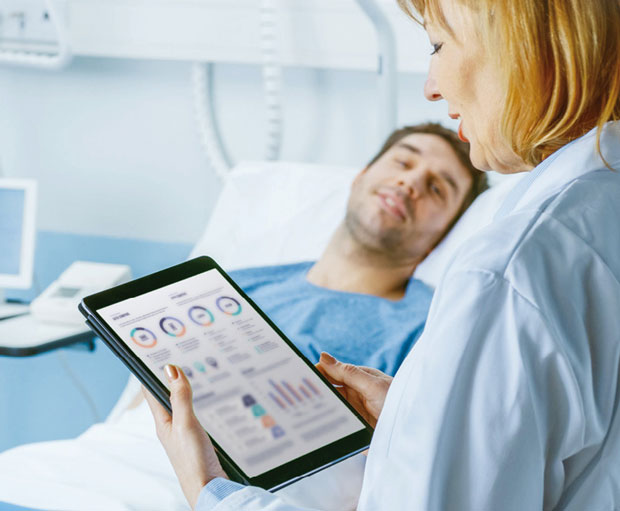INTEGRATED APPROACH
Currently, scaling up these sorts of innovations can be difficult as suppliers to the NHS must deal with separate Integrated Care Boards (ICBS), but Lilley predicts a more integrated approach is gradually being adopted as the healthcare sector invests more in data driven services. For instance, Sodexo has recently launched a new client insight platform that gives clients transparent access to all the services that are delivered and records performance in huge granularity.
Says Lilley: “Rather than relying on monthly reports produced by an account director, they now have 24/7 access on a dashboard to all our services. And we go beyond that, as we’re providing them information on other services that we don’t deliver. In this way we’re giving valuable data back to the NHS.”
Another innovation is ‘Experiencia’ which was first launched in the US to meet a need for predominantly private markets to improve patient’s satisfaction levels. It has now been adapted for the UK in line with the patient experience being one of the key priorities for the NHS. This service allows a ‘patient ambassador’, equipped with an iPad – to visit the wards and hold scripted five-minute conversations with patients. Questions are suited to age, illness etc. and the answers go into a dashboard that enable hospital executives and clients to monitor satisfaction levels and detect trends.
Whereas traditionally in hospitals, the data from patients tended to be collected at the point of discharge – this approach ensures hospitals can collect real-time data.
“Manchester hospital said it was one of the most innovative things they’ve ever seen” says Lilley. “We’ve now introduced another aspect of that, which is the welcome guide, where there’s a QR code on the bedside tables of the patients, which they and their families can scan that shows them the menus, when certain staff are on the wards and information on visiting times similar info to what might be available in hotels.”
HOSPITAL FOOD
Reflecting this hospitality ethos is that of serving patients food when they want it rather than taking a regimented hospital food approach. While there is a link between nutrition and recovery from ill health, people don’t always want to eat during set meal times.
As Lilley explains: “In our daily lives we eat when we want to eat, yet when you go into a hospital, you have mandated mealtimes. We carried out a few pilots and then rolled out a flexible meal service to some client hospitals allowing patients to eat when they want.”
“Our research has shown that if you give food at standard meal times, 26 per cent of patients ate all their food and when you gave it them at the time they wanted it, 78 per cent ate all their food. It’s a layering effect, with every little thing making a difference.”
The quality of the food is also a priority, which is why Sodexo works with suppliers like Apetito which specialises in providing nutritious meals to ensure the food is dietetically nourishing.
They’ve also joined forces with Culinary Medicine, an SME that was set up by a GP who found that when she went through medical training, there was hardly anything about food and little information about how nutrition helps with the power of recovery. She’s set up her business to educate other doctors, primarily GPs in primary care, about why nutrition is so important and help them have productive conversations with their patients.
Explains Lilley: “We joined forces with Culinary Medicine a few months ago with the aim of running training programmes for acute clinicians and we’re about to roll that out now to several of our sites, offering online and offline training that is CPD accredited.
“It will hopefully not only help with patient conversations, but again, give some relevance to why we serve certain food to certain patients at certain times, and why the balance of the menu is crucial.”
NEW CONTRACTS
Reflecting the push within the NHS to outsource to specialist partners, Sodexo Health and Care has recently mobilised contracts with East Suffolk and North Essex NHS Foundation Trust which cover the Trust’s two acute hospitals – Colchester and Ipswich, and community services in East Suffolk and North Essex. Prior to Sodexo being awarded the contract there was a mix of the services being delivered in-house and through a provider.
Says Lilley: “We went live with Colchester on the first of April and that site was previously in-sourced, so the culture change has been incredible, with over 400 people that came across and a further 600 who will be transferring to us as we mobilise other hospitals and centres within the contract. The culture change, the governance, the management style and the processes they must get used to, has been significant, but it went smoothly, and we’re already planning for significant improvements.”
While Lilley’s exceptional background in healthcare and the service industries has enabled him to innovate within Sodexo’s Health and Care business, he’s quick to point out that as a group the organisation is utilising learnings from other sectors.
“One of the advantages we have in Sodexo is that we range from Royal Ascot to hospitals, from oil rigs to schools and universities and from blue chip companies to prisons. There are pockets of innovation that happen throughout our services, and we aim to ensure we continually take those bits of best practice and use them to benefit other sectors.”





